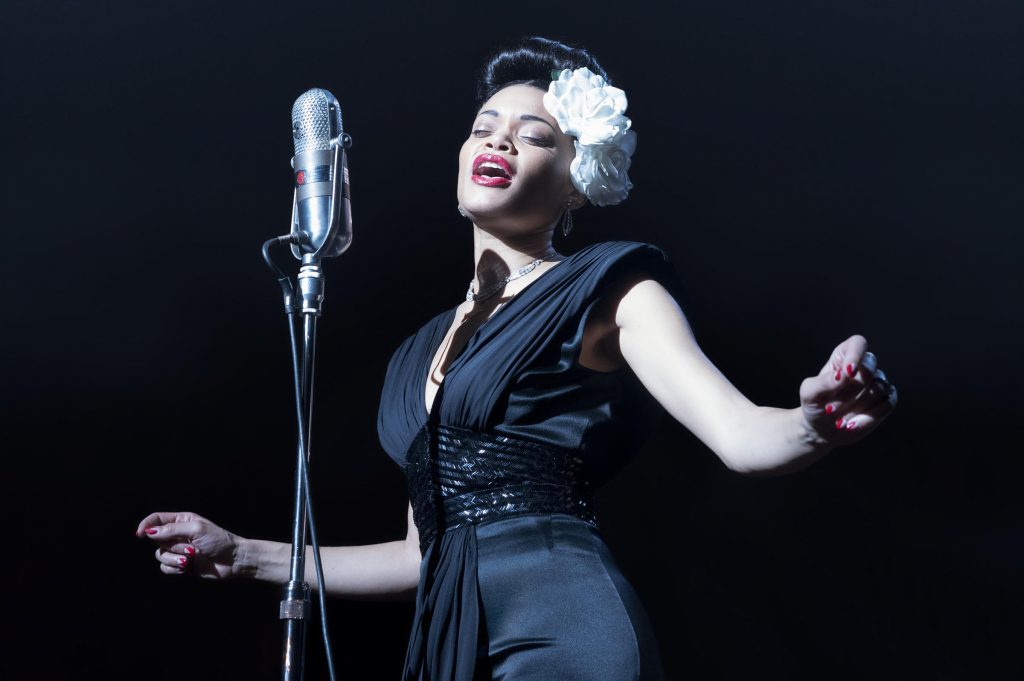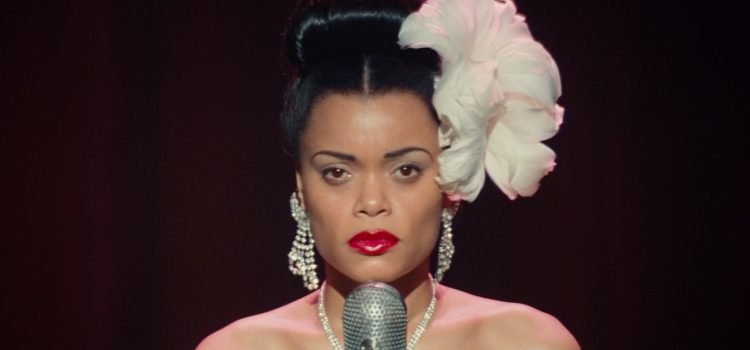By Lynn Venhaus
When the Academy Award nominations are announced on March 15, I will wager that Andra Day will be among the five names listed for Best Actress. She is ferocious in her portrayal of the troubled, self-destructive and talented vocalist – and even more remarkable, it is her first major acting role.
Day, a Grammy-nominated R&B singer, summons raw emotion when depicting Holiday’s sad, sordid life. When she is on stage, singing Holiday’s classics, she is incandescent.
Costume designer Paulo Nieddu, known for “Sex and the City” and “Empire,” provides an elegant and opulent look for the entertainer, while the hair and makeup department’s work is award-worthy.
Starting in 1947, iconic jazz and blues singer Billie Holiday (Andra Day) was targeted by the Federal Department of Narcotics for not only her heroin use, but also for singing the praised yet controversial “Strange Fruit,” which is about a lynching. An undercover sting operation is led by black federal agent Jimmy Fletcher (Trevante Rhodes), with whom she had a tumultuous affair.
Unfortunately, Day is far better than the film’s material. While focusing on the last 10 years of Holiday’s life, director Lee Daniels and screenwriter Suzan-Lori Parks cram too much into the narrative and allow characters to come and go with little context.
It’s frustrating to watch because of the inconsistencies, and the rest of the characters are caricatures.
Parks, the Pulitzer Prize-winning playwright, adapted the screenplay from Johann Mari’s book, “Chasing the Scream: The First and Last Days of the War on Drugs,” specifically the chapter “The Black Hand.”
The bold “Strange Fruit” helped Holiday gain prominence, but the ballad was a lightning rod for controversy and her defiance was a source of aggravation for the feds.
In 1999, Time magazine called it “The Song of the Century” and it was inducted into the Grammy Hall of Fame in 1978. The song is credited as a catalyst in the civil rights movement.
But back in her day, Lady Day suffered for her art.
Garrett Hedlund, who desperately needs a hit after a string of duds since his breakout role in the 2004 film “Friday Night Lights,” plays the antagonistic bigoted bully Harry Anslinger, head of the bureau, almost as if he’s Snidely Whiplash.
Natasha Lyonne plays actress Tallulah Bankhead, who was rumored to have a relationship with Holiday, but it’s a useless part of the narrative, and just dropped in with little context.
Faring better is Trevante Rhodes as Jimmy Fletcher, a complex agent who falls in love with Holiday. Their relationship is confounding, mainly because of Holiday’s other husbands and lovers – and hard to keep who’s who straight because of the jumps back and forth. Rhodes, who played the grown-up Chiron in “Moonlight,” does what he can with playing a real, conflicted character.
Holiday’s personal life was messy, and the movie shows how drug use, excessive drinking, non-stop smoking and abuse by awful men lead to her decline. It’s a tragic tale, to be sure, but the graphic shots of injecting heroin and the physical assaults are tough to watch.
However, as the third film this past year showing how evil J. Edgar Hoover’s moves as the director of the FBI were, it is always worth remembering his abuses of power. (The other two films: “MLK/FBI” and “Judas and the Black Messiah”).
While Day shines a light on this legend, the film ultimately disappoints. Holiday, and Day, deserved better.

“The United States vs. Billie Holiday” is a biographical drama, directed by Lee Daniels and starring Andra Day, Trevante Rhodes, Garrett Hedlund,. It is rated R for drug use, domestic violence, language, nudity and mature themes and the run time is 2 hours, 9 minutes.
Lynn’s Grade: B. Now available streaming on Hulu.

Lynn (Zipfel) Venhaus has had a continuous byline in St. Louis metro region publications since 1978. She writes features and news for Belleville News-Democrat and contributes to St. Louis magazine and other publications.
She is a Rotten Tomatoes-approved film critic, currently reviews films for Webster-Kirkwood Times and KTRS Radio, covers entertainment for PopLifeSTL.com and co-hosts podcast PopLifeSTL.com…Presents.
She is a member of Critics Choice Association, where she serves on the women’s and marketing committees; Alliance of Women Film Journalists; and on the board of the St. Louis Film Critics Association. She is a founding and board member of the St. Louis Theater Circle.
She is retired from teaching journalism/media as an adjunct college instructor.

